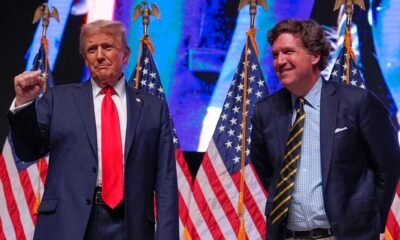attorney general
Mayes and AGs Unite to Challenge Trump’s Controversial Tariffs

Attorney General Kris Mayes has announced a significant legal challenge against international tariffs imposed by former President Donald Trump, arguing that these tariffs are unconstitutional. Mayes seeks a ruling from the U.S. Court of International Trade to annul these trade measures.
On April 23, Mayes, alongside attorneys general from several other states, acknowledged that while emergency tariffs may be permissible under certain circumstances, their application must be limited and short-term. However, she claims that Trump’s tariffs were justified merely by a perceived trade imbalance.
“These edicts reflect a national trade policy that now hinges on the president’s whims rather than the sound exercise of his lawful authority,” the lawsuit states, arguing that the president’s broad and unilateral approach undermines the constitutional framework and generates economic turmoil in the U.S.
The lawsuit further criticizes the rationale for imposing tariffs on goods from Mexico, Canada, and China, specifically targeting claims related to drug smuggling and migration. According to the plaintiffs, these justifications lack a direct correlation to the actual import tariffs being levied.
Co-leading the lawsuit with Oregon’s Attorney General Dan Rayfield, Mayes emphasized that the implications extend beyond legal authority. She highlighted the Arizona Department of Transportation’s reliance on imported equipment, which is already facing increased costs due to these tariffs.
“The tariffs are already increasing costs for ADOT,” the lawsuit claims, pointing to one contractor requesting a price hike due to these tariff increases.
The impact could also reach state universities involved in research, particularly concerning specialized equipment that isn’t available domestically. One example given involves technology essential for the assembly of semiconductor chips, which Mayes indicated is not produced in the U.S., with projections that tariffs on this project could lead to an increase of $1.4 million.
Beyond these specific cases, the challengers argue that studies conducted by the administration suggest that American consumers and businesses will absorb 95% of the tariff costs, effectively imposing a hidden tax on imports.
The lawsuit calls for the court to rule the tariffs lacking a legal foundation. “The Constitution assigns to Congress, not the president, the power to lay and collect taxes, duties, imports and excises,” it asserts.
Additionally, the challengers allege that the tariffs are arbitrary, with rates starting as high as 10%. They cite examples of tariffs being applied even to locations completely uninvolved in international trade, such as military bases and remote islands inhabited solely by wildlife.
Ultimately, the lawsuit posits that the underlying issue isn’t rooted in the actions of foreign nations but rather reflects a significant trade deficit that sees U.S. consumers purchasing more from abroad than what is sold domestically by American companies.


















